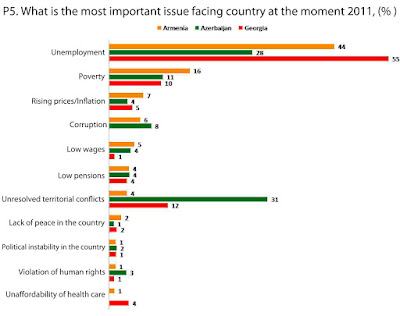By Valeria Sargsyan

Caucasus Barometer 2011 Presentation
On September 12, 2012, Dr. Heghine Manasyan, Country Director of the Caucasus Research Resource Centers (CRRC)-Armenia held a presentation on selected findings from the Caucasus Barometer (CB) 2011 survey at the Ani Plaza Hotel in Yerevan, Armenia. The CB is a yearly cross-border project, initiated by the Eurasia Partnership Foundation, which aims to study public opinion on social, political and economic processes in the South Caucasus region.
The presentation was opened by Yerevan State University Vice-rector, Mr. Ruben Markosyan. He greeted the audience, which consisted of public officials, NGO representatives, the academic community, media persons, young activists and the general public. Mr. Markosyan emphasized the role of CRRC-Armenia in revealing public opinion trends towards development issues in South Caucasus.
Dr. Manasyan presented the results of CB 2011 survey, which was simultaneously conducted in Armenia, Azerbaijan and Georgia among 6,000 households.
The findings show that, as compared to CB 2010 results, the population of the South Caucasus region remains concerned with socio-economic issues. In Armenia, 44% of the general population indicated unemployment as the most important issue facing the country (32% in 2009 and 45% in 2010). Poverty was named as the most important issue by 16% (12% in 2009, 10% in 2010). Thirty one percent of Azerbaijanis noted unresolved territorial issues as country’s main concern, followed by 28% who said unemployment.
Another noteworthy tendency throughout the South Caucasus and in Armenia in particular, is an interest in migration. Generally, a large number of South Caucasians show interest in temporary or permanent migration; 57%, 47% and 45% of Armenians, Azerbaijanis and Georgians, respectively say they would temporary leave their country, while 25% of Armenians, 16% of Azerbaijanis, and 11% of Georgians say they would take an opportunity to move abroad for permanent residency.
It is interesting to note that Armenians show a relatively higher level of happiness (6.6 out of 10 vs. 5.1 for general satisfaction of life) despite distressing socioeconomic and political perceptions (although Georgians' scores are 6.9 and 5.6, correspondingly).

CRRC's CB survey databases and the supporting documents are free and available for all those interested in in-depth analysis and in advancing social research and public policy.
Caucasus Barometer 2011 Presentation




Comments